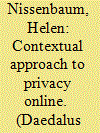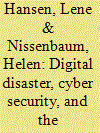|
|
|
Sort Order |
|
|
|
Items / Page
|
|
|
|
|
|
|
| Srl | Item |
| 1 |
ID:
108863


|
|
|
|
|
| Publication |
2011.
|
| Summary/Abstract |
Recent media revelations have demonstrated the extent of third-party tracking and monitoring online, much of it spurred by data aggregation, profiling, and selective targeting. How to protect privacy online is a frequent question in public discourse and has reignited the interest of government actors. In the United States, notice-and-consent remains the fallback approach in online privacy policies, despite its weaknesses. This essay presents an alternative approach, rooted in the theory of contextual integrity. Proposals to improve and fortify notice-and-consent, such as clearer privacy policies and fairer information practices, will not overcome a fundamental flaw in the model, namely, its assumption that individuals can understand all facts relevant to true choice at the moment of pair-wise contracting between individuals and data gatherers. Instead, we must articulate a backdrop of context-specific substantive norms that constrain what information websites can collect, with whom they can share it, and under what conditions it can be shared. In developing this approach, the paper warns that the current bias in conceiving of the Net as a predominantly commercial enterprise seriously limits the privacy agenda.
|
|
|
|
|
|
|
|
|
|
|
|
|
|
|
|
| 2 |
ID:
092347


|
|
|
|
|
| Publication |
2009.
|
| Summary/Abstract |
This article is devoted to an analysis of cyber security, a concept that arrived on the post-Cold War agenda in response to a mixture of technological innovations and changing geopolitical conditions. Adopting the framework of securitization theory, the article theorizes cyber security as a distinct sector with a particular constellation of threats and referent objects. It is held that "network security" and "individual security" are significant referent objects, but that their political importance arises from connections to the collective referent objects of "the state,""society,""the nation," and "the economy." These referent objects are articulated as threatened through three distinct forms of securitizations: hypersecuritization, everyday security practices, and technifications. The applicability of the theoretical framework is then shown through a case-study of what has been labeled the first war in cyber space against Estonian public and commercial institutions in 2007.
|
|
|
|
|
|
|
|
|
|
|
|
|
|
|
|
|
|
|
|
|